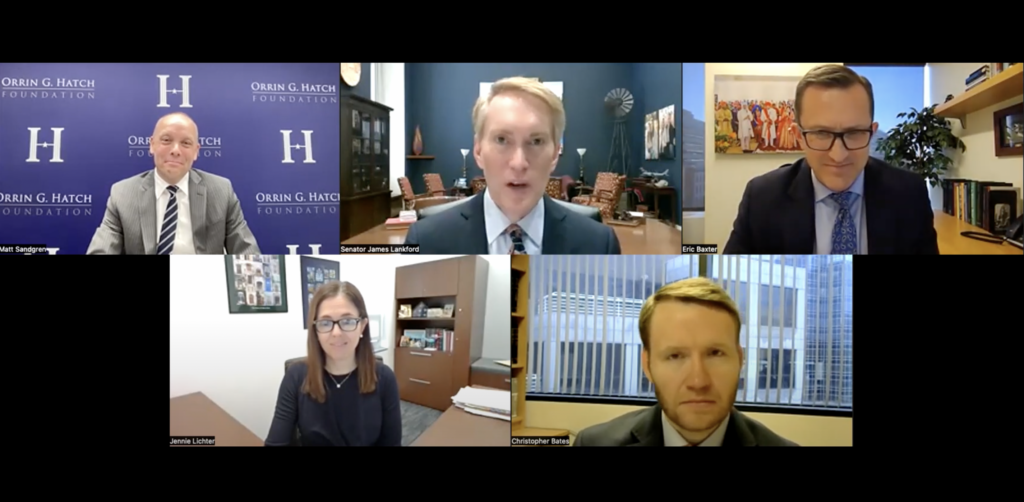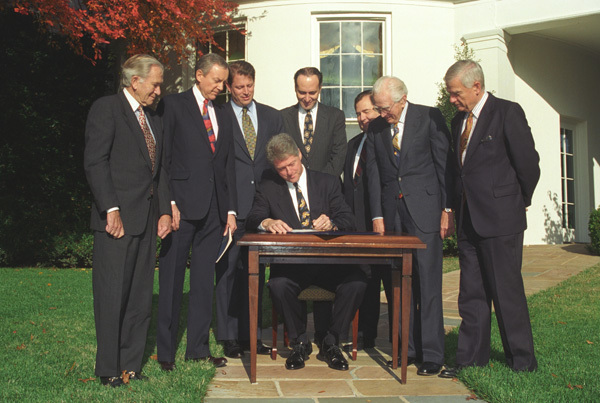
WASHINGTON (BP) – Thirty years after a landmark piece of religious freedom legislation was enacted, it’s more needed than ever.
That was evident this week to Sen. James Lankford, R-Okla., when a U.S. State Department employee told him she quoted Scripture in her draft of a speech only to have it stricken by a government attorney who said quoting the Bible is not permissible. “Are they aware that the president of the United States has quoted Scripture in his speeches and that George Washington quoted Scripture in his speeches?” Lankford said Nov. 16 at an online event hosted by the Orrin G. Hatch Foundation commemorating the 30th anniversary of the Religious Freedom Restoration Act (RFRA).

“It’s been an interesting season for religious liberty because for some reason our religious liberty has suddenly become controversial,” Lankford said. Protecting the right of all Americans “to live their faith” is “important for any person of faith. That’s a basic American value, and we can’t lose it.”
Three decades after President Bill Clinton signed RFRA into law on Nov. 16, 1993 – with virtually unanimous support in both the House and the Senate – the religious liberty protections it enshrined are facing renewed opposition. But upholding RFRA is key to protecting religious liberty for the next 30 years, according to religious freedom advocates.
‘A really bad Supreme Court decision’
In short, RFRA reinstated a high standard for allowing government to impede the free exercise of religion. According to RFRA, laws and regulations may impede someone’s religious practice only when doing so advances a “compelling government interest” and the government acts in the least restrictive way possible.
The legislation was spurred in large measure by bipartisan outrage at a 1990 U.S. Supreme Court ruling. Two Native Americans were fired from their jobs at an Oregon rehab clinic after testing positive for a drug ingested in Native American religious ceremonies. The state of Oregon denied their claim for unemployment benefits because they were fired for misconduct. The fired workers sued, citing their right to engage in religious practices.
The Court’s majority opinion in Employment Division v. Smith, written by Antonin Scalia, sided with Oregon. A law may impede religious practice, the ruling stated, if that “is not the object of the [law] but merely the incidental effect of a generally applicable and otherwise valid provision.”
Then-Rep. Chuck Schumer, D-N.Y., introduced RFRA in the House, and it gained smooth passage in both chambers of the legislature – supported by, among other groups, the SBC’s Christian Life Commission (CLC), a precursor organization to today’s Ethics & Religious Liberty Commission (ERLC).
“We all felt like the Religious Freedom Restoration Act was exactly what it said it was,” said Richard Land, who served as CLC executive director when RFRA became law. “It was a legislative attempt to correct the consequences of a really bad Supreme Court decision.”
The provisions of RFRA remained popular across the American political spectrum until sexual liberty began to trump religious liberty in legislation and court decisions of the early 21st century. In some locales, health care workers were told they must perform abortions regardless of their religious convictions. Some business owners, like Washington florist Barronelle Stutzman and Colorado baker Jack Phillips, were told they must provide services for same-sex weddings despite their religious beliefs about marriage.
Religious liberty’s erosion has coincided with the rise of “nones,” Americans with no religious faith. Thirty percent of Americans claim no religious affiliation, according to a poll released last month by the Associated Press and the NORC Center for Public Affairs Research.
“Religious liberty has a big PR problem because there are so many people now who aren’t personally religious and maybe don’t even have religious people in their family or in their friend circle,” said Jennie Bradley Lichter, deputy general counsel of The Catholic University of America.
Protecting ‘our deepest held convictions’
Amid such challenges, some observers have wondered whether religious liberty can persist as a basic value in an increasingly secularized American society. It must, say religious liberty advocates.
“We now have 30 years with RFRA … showing that we haven’t had anarchy or chaos” when religious liberty is upheld, Eric Baxter, vice president and senior counsel at the conservative legal group Becket, said at the Hatch Foundation forum.
Among key battlegrounds for religious liberty cited by forum participants:
- Religious colleges and universities are contending for religious liberty on multiple fronts. Professors in all fields seek to teach according to their religious convictions. Universities also want the right to ban student extracurricular groups that stand for ideas contrary to the school’s religious values. Additionally, colleges are fighting for the right to enforce their religious beliefs about sexuality and gender in decisions concerning student housing and athletics.
- Federal agencies must be pressed to accommodate religious liberty in their rule making. For example, federal grants should not be denied to businesses, schools or other organizations whose religious beliefs forbid them from recognizing same-sex marriage.
- Members of the Sikh religion should not be forced to violate their convictions by cutting their hair and beards in military basic training.
The best way Christians can defend religious liberty, Land said, is to exercise it. “If a zoning commission tells you that you can’t have a Bible study in your home, have it anyway. You challenge zoning laws that try to restrict your freedom,” he said. Organizations like Becket and Alliance Defending Freedom will provide legal representation for free.
It’s also important for Christians to defend the religious liberty of minority religions with which they disagree – like Muslims, Jehovah’s Witnesses and Mormons. “If they can stop them [from practicing their religion] today, they can stop us from doing it tomorrow,” Land said.
Current ERLC President Brent Leatherwood underscored the need to defend religious freedom, including continued enforcement of RFRA. He said the legislation reinforces “what Southern Baptists and so many Americans have long known to be true: freedom of religion includes the free expression of our deepest held convictions.”
“RFRA builds upon what our Founders enshrined in the First Amendment,” Leatherwood said, “ensuring that the federal government must meet the highest levels of scrutiny when it attempts to override religious expression. This protects believers and people of faith around the nation from needlessly surrendering their beliefs to the will of the government. The ERLC continues to work with legislators to see more protections like RFRA that build upon the Southern Baptist legacy of religious liberty.”
















